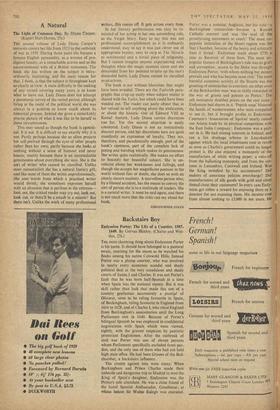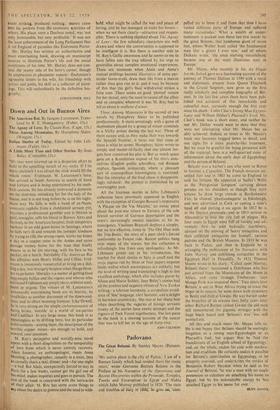Backstairs Boy
Tun most charming thing aboUt Endymion Porter is his name. It should have belonged to a pastoral swain, yearning for the moon as he watched his flocks among his native Cotswold Hills. Instead Porter was a plump courtier, who was involved in nearly every economic scandal and shady political deal at the very scandalous and shady courts of James I and Charles. It was not Porter's fault that he Was born half-Spanish at a time when Spain was the national enemy. But it was skill rather than luck that made this son of a country gentleman successively a protegi of Olivares, soon to be ruling favourite in Spain, of Buckingham, ruling favourite in England from 1616 to 1628, and of Charles I, who ruled England from Buckingham's assassination until the Long Parliament met in 1640. Because of Porter's bilingual Spanish he was employed in confidential negotiations with Spain which were viewed, rightly, with the gravest suspicion by patriotic protestant Englishmen. After the outbreak of civil war Porter was one of eleven persons whom Parliament specifically excluded from par- don, and the only one of them who had not held high state office. He had been Groom of the Bed- chamber, a backstairs influence.
The counts against him were many.' When Buckingham and Prince Charles made their imbecile and dangerous trip to Madrid to woo the King of Spain's daughter, Endymion was the Prince's sole attendant. He was a close friend of the hated Spanish Ambassador, Gondomar; at whose behest Sir Walter Ralegh was executed. Porter was a nominal Anglican, but his wife- a Buckingham connection—became a Roman Catholic convert and was 'the soul of the proselytising movement at court.' The most tin- popular institution of the Stuart regime was the Star Chamber, because of the heavy and arbitrary fines it levied : Endymion made about £750 a year as Receiver of these fines. The most un- popular feature of Buckingham's rule was its graft and corruption ; access to the Duke was through Endymion Porter, 'with whom nothing but money prevails and who has become most rich.' The most harmful economic activity of the Stuarts was the granting of monopolies to courtiers: no other even of the Bedchamber men 'was so richly rewarded in the way of grants and patents as Porter.' The salt monopoly doubled prices on the east coast: Endymion had shares in it. 'Popish soap' blistered the hands of washerwomen who were compelled to use it; but it brought profits to Endymion. Courteen's 'Association of Squires' nearly ruined our Asiatic trade by its piratical competition with the East India Company : Endymion was a part- ner in it. He had mining interests in Ireland, and ran a fen drainage scheme in Lincolnshire against which the local inhabitants rose in revolt as soon as Charles's government could no longer protect it. He also enjoyed a monopoly of the manufacture of white writing paper; a rake-off from the ballasting monopoly, and from the cus- toms in Lancashire, Cornwall and Ireland. Was the King swindled by his accountants? Did makers of assurance policies overcharge? Did manufacturers of silk goods with gold and silver thread cheat their customers? In every case Endy mion got either a reward for exposing them or a douceur for not exposing them. His income rose from almost nothing to £3,000 in ten years. He
made nothing, produced nothing: money came Into his pockets from the economic activities of others. His place, even a Duchess noted, was 'not only honourable but very profitable.' It was not the least achievement of the Long Parliament that it rid England of parasites like Endymion Porter.
Mr. Huxley has written an authoritative and most entertaining book, drawing on manuscript sources to illustrate Porter's life and the social conditions of his time. Mr. Huxley does not con- ceal the seamy side of his hero's career, though he emphasises its pleasanter aspects—Endymion's agreeable letters to his wife, his friendship with artists and poets, his skill as a collector of paint- ings. This will undoubtedly be the definitive bio- graphy.
CHRISTOPHER HILL







































 Previous page
Previous page